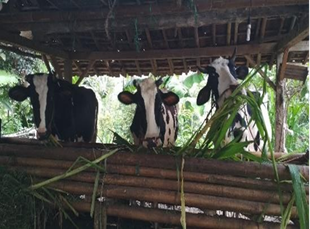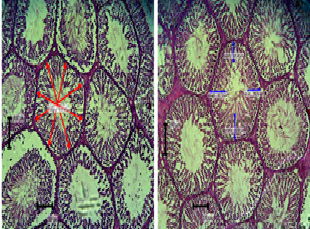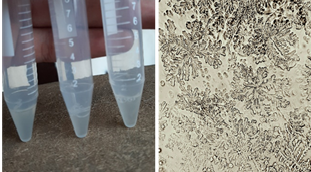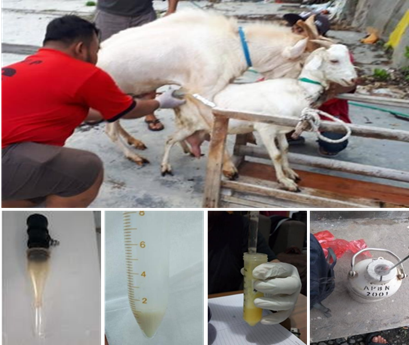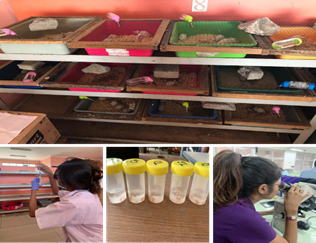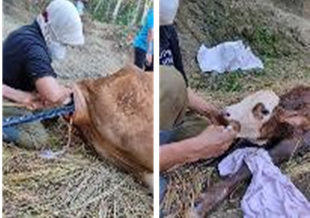PENGARUH PEMBERIAN MADU TERHADAP STAGING SPERMATOGENESIS DAN SEL LEYDIG PADA MENCIT (Mus musculus) YANG DIINFEKSI Toxoplasma gondii
Downloads
Ahmed, E. A. and D. G. De Rooij. 2009. Staging of Mouse Seminiferous Tubule Cross-Section. Scott Keeney. Humana Press Springer Science Busuness Media. Chanon, J. Y., Seguin, R. M. and Kasper, L. H. 2000. Differential Infectivity and Division of Toxoplasma gondii in Human Peripheral Blood Leukocytes. Infect. Immunol. 68 : 4822-4826. Clermont, Y. and Perey. 2008. Quantitive Study of the Cell Populaion of the Seminiferus Tubules in Immature Rats. The American Journal of Anatomy. 100 (2) : 353. Dubey, J. P. 1999. Toxoplasma gondii. http://www.medimicrochapter84.html Friedl, K. E., R. J. Moore, R. W. Hyot, L. J. Marchitelli, L. E. Martinez-Lopez and E. W. Askew. 2000. Endocrine Markers of Semistravvation in Healthy Lean Men in a Multistressor Enfironment. J Appl Phsiol. 88: 1820-1830.
Holdcraft, R. W and E. B. Robert. 2004. Hormonal Regulation of Spermatogenesis. International Journal of Andrology. 27: 335-342. Holman P. 1995. Pyridoxine-Vitamin B6. J Autralian Collegue of Nutritionl and Enviromental Medicine. 14(1): 5-16. Johnson S., and J. Nimisha. 2010. Antibiotic residues in honey. in: Center for Science and Enviroment. Tughlakabad Institusional Area. New Delhi. Khanif. 2012. Gambaran Histopatologi Testis Mencit (Mus musculus) yang Diinfeksi Toxoplasma gondii [Skripsi]. Universitas Airlangga. Surabaya. Knobil, E. 2006. Physiology of Reproduction. 3rd Ed, Elsevier Academic Press, Oxford. 223-224. Krell, R. 1996. Value-Added Product of Bee Keeping. FAO Agricultural Services Bulletin No.124. Food and Agriculture Organization of the United Nations Rome. Mufasirin, dan Endang S. 2013. Vaksininasi Protein Ekskretori-Sekretori Toxoplasma gondii Hasil Biakan in vivo Membangkitkan Respons Imun Non Protektif. Jurnal Veteriner. 14(1). Nugroho, C. M. H. 2011. Potensi Propolis terhadap Jumlah Sel Spermatogenik, Sel Sertoli, Tebal Epitel dan Diameter Tubulus Seminiferus Testis Mencit (Mus musculus) [Skripsi]. Fakultas Kedokteran Hewan Universitas Airlangga.Rio,Y. dan Aziz, D. 2012. Perbandingan Efek Antibakteri Madu Asli Sikabu dengan Madu Lubuk Minturun terhadap Escherichia Coli dan Staphylococcus Aureus secara In Vitro. Jurnal Kesehatan Andalas. 1(2). Said, M. 2013. Gambaran Histopatologi Testis Mencit (Mus musculus) yang Diinfeksi Toxoplasma gondii Stadium Takizoit Secara Oral [Skripsi]. Fakultas Kedokteran Hewan Universitas Airlangga. Surabaya. Salman, T. M., L. A. Alagbonsi and L. A. Olayaki. 2013. Honey Increases Sperm Count in Male Albino Rats by Enhancing Testosterone Production. Journal of the Nigerian Society for Experimental Biology. 25(2): 39-44.
Soedarto. 2008. Parasitilogi Klinik. Airlangga University Press. Surabaya. Weinbauer, G. F., S. Schlatt, V. Walter and E. Nieschlag. 2001. TestosteronInduced Inhibition of Spermatogenesis is More Closely Related to Suppresion of FSH than to Testicular Androgen Levels in The Cynomulgus Monkey Model (Macaca fascicularis). Journal of Endocrinology. 168: 25-38. Yousef, M. I. and A. F. Salama. 2009. Propolis Protection from Reproductive Toxicity of Triphenyltinin Male Rabbits. Food and Chemical Toxicology. 1646-1652. Zainuddin, M. 2000. Metodologi Penelitian. Universitas Airlangga. Pasca Sarjana. 22-23.
Ovozoa by Unair is licensed under a Creative Commons Attribution-ShareAlike 4.0 International License.
1. The journal allows the author to hold the copyright of the article without restrictions.
2. The journal allows the author(s) to retain publishing rights without restrictions
3. The legal formal aspect of journal publication accessibility refers to Creative Commons Attribution Share-Alike (CC BY-SA).
4. The Creative Commons Attribution Share-Alike (CC BY-SA) license allows re-distribution and re-use of a licensed work on the conditions that the creator is appropriately credited and that any derivative work is made available under "the same, similar or a compatible license”. Other than the conditions mentioned above, the editorial board is not responsible for copyright violation.






























